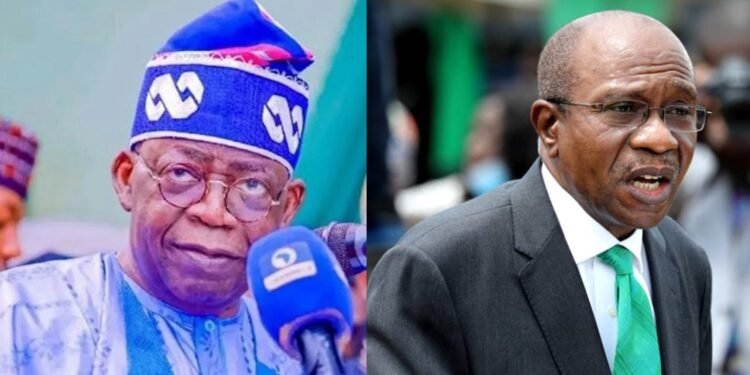Suspended Governor of the Central Bank of Nigeria (CBN), Godwin Emefiele, is now confronted with the prospect of facing up to 20 new charges as the federal government reveals its intention to bring forth additional allegations.
Mohammed Abubakar, the Director of Public Prosecution (DPP) of the federation, addressed reporters at the Federal High Court in Ikoyi on Tuesday, disclosing the government’s plans.
One of the charges includes “conferring unlawful advantages”.
The move comes on the heels of the release of the CBN’s financial statement that disclosed the CBN owes a combined total of $7.5 billion to JP Morgan and Goldman Sachs, as of the close of the financial year in December 2022.
The filing of new charges follows the federal government’s earlier oral application to withdraw the charge of illegal possession of firearms against Emefiele, which has sparked a series of legal maneuvers and controversies.
Initially arraigned on July 25 on a two-count charge related to “illegal possession of firearms,” Emefiele was directed by Nicholas Oweibo, the presiding judge at the Federal High Court in Ikoyi, Lagos, to remain in the custody of the Nigeria Correctional Service (NCoS) until his bail conditions were fulfilled.
However, the Directorate of State Services (DSS) maintained its demand for Emefiele’s return to their custody, leading to a standoff between the DSS and prison officials. In the aftermath, Emefiele was re-arrested by the DSS within the court premises.
During a subsequent hearing, the Director of Public Prosecution, Mohammed Abubakar, informed the court of the federal government’s intention to withdraw the charge against Emefiele. Abubakar cited relevant sections of the 1999 constitution and the Administration of Criminal Justice Act (ACJA) 2015 to justify the withdrawal, pointing to “emerging facts and circumstances of this case that required closer investigation” as the rationale.
In response, Joseph Daudu, lead counsel to Emefiele, contested the oral nature of the application for withdrawal. Daudu argued that the authority to discontinue or withdraw charges resides with the Attorney-General of the Federation (AGF) and that there is currently no legally appointed AGF in possession of this power or delegation.
Daudu emphasized that a written application was necessary for withdrawal and informed the court about a separate application filed by the defense team concerning the DSS’s alleged disobedience to the order granting bail to Emefiele.
Judge Oweibo acknowledged the surprising nature of the application for withdrawal and declared that he would review the particulars before delivering a well-considered decision.
The proceedings were adjourned to August 17, allowing for further deliberation on this intricate legal matter.








